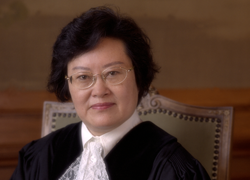
In 2011, Her Excellency Judge Xue Hanqin picked up where Professor Wang left off 27 years earlier in her Special Course at The Hague Academy of International Law entitled, “Contemporary Chinese Perspectives on International Law.” Judge Xue became a member of the International Court of Justice on June 29, 2010. She received her legal education at Peking University (diploma in international law) and Columbia University (LL.M and J.S.D.) and served as China’s Ambassador to the Netherlands as well as China’s first ambassador to Association of Southeast Asian Nations (ASEAN) before being selected as a member of the ICJ.
Throughout the week of her Special Course, Judge Xue did more than merely deliver a comprehensive presentation. She was willing to stay in the corridors of the Academy, sometimes an hour after her lectures, to answer students’ questions and respond to their concerns. Judge Xue honored us with her presence and shone a great deal of light on the Chinese perspective. While Judge Xue did not speak for the Chinese government, her service as an ambassador and a representative to the International Court of Justice suggests that her views closely track the official views of the PRC. Over the next few weeks, I hope to share my understanding and impressions of the contemporary Chinese perspective on international law as expressed by Judge Xue.
This six-part series will proceed as follows: Part 2 will give a brief overview of Chinese history as it relates to international law; Part 3 will focus on the Chinese notion of sovereignty and how China’s history has colored that notion; Part 3 will focus on sustainable development, the environment, and climate change; Part 4 will discuss China’s conception of human rights, focusing on constitutional, legislative, administrative, and jurisprudential developments, and; Part 5 will conclude by offering some commentary on and criticism of the Chinese model and Chinese state practice.
China has become a central player on the international stage, and its importance will only deepen and broaden in the future. As such, it is essential for those interested in international law and foreign affairs to gain appreciation for the Chinese worldview. Hopefully, this six-part series will paint an accurate and informative portrait of contemporary Chinese perspectives on international law.


